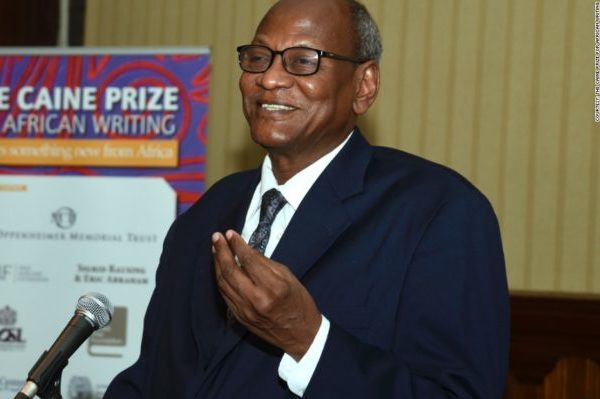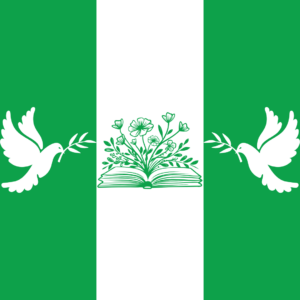Sudanese poet Bushra al-Fadil has been awarded the 2017 Caine Prize for African Writing for his poetic, evocative, classic-in-the-making short story, “The Story of the Girl Whose Birds Flew Away.” The judges highly complimented the story stating “even when we fought it was poetic.” Chair of the judges, Nii Ayikwei Parkes, stated:
Rooted in a mix of classical traditions as well as the vernacular contexts of its location, Bushra al-Fadil’s “The Story of the Girl Whose Birds Flew Away,” is at once a very modern exploration of how assaulted from all sides and unsupported by those we would turn to for solace we can became mentally exiled in our own lands, edging in to a fantasy existence where we seek to cling to a sort of freedom until ultimately we slip into physical exile.
In a shortlist filled with near-records, his win has now set three records. The second ever to have his story originally in Arabic, and now the second Sudanese to win, Bushra already entered the record books by being, at 65, the oldest ever shortlistee for the prize. (The first Sudanese to win is Leila Aboulela in 2000, at the prize’s inaugural ceremony.) Having lived in Saudi Arabia since being expelled by the Sudanese government in the 1990s for his political activism, he is now the first to win the prize in exile. In addition to these, Bushra now holds the record of winning for the oldest story: his story was written 38 years ago.
First written in Arabic in 1979, “The Story of the Girl whose Birds Flew Away” was translated into English in 2016 by Max Shmookler with support from Najlaa Osman Eltom. The story was published in The Book of Khartoum – A City in Short Fiction edited by Raph Cormack & Max Shmookler (Comma Press, UK. 2016).
Here is an excerpt from our review of the story:
With its urgent and unsystematic sentences, al-Fadil’s tale does not seek to make sense of this chaos; rather, by placing itself in its centre, it revels in it.
To approach the narration without a preconception is to feel this narrator’s hunger, to think his thoughts with him. Without being infected by his madness, the story becomes simply obscure and pointless, like a poem we have been told is particularly good but we do not quite see or know why. So then the city’s rowdiness is a premise upon which the narrator’s hunger is built.
At its best the dialogue rocks gently back and forth, tidal and smooth. What Bushra al-Fadil offers is best appreciated as art for its own sake. To try tormenting meaning out of it will most likely make it lose its coveted haunting feel.
It isn’t a surprise that this narrator, who happens to be a poet, is all too familiar with isolation, whether self-imposed as when he resorts to escapist daydreaming in the bus, or community-imposed as when he is considered mad for thinking differently of what happened to The Girl Whose Birds Flew Away and her talisman. The gathering of the crowd is the final rite in his excommunication. By taking to the tarmac, terribly disappointed, he embarks on a journey into self, finding consolation in the hope that there is rest in the eyes of “the lovers at the river.”
This could be symbolic of the exilic experience of generations of Sudanese poets. Mahammad al-Wathig’s Sudanese Poetry in the 20th Century is strewn with such narratives. There was Al-Tijan…Idris Jamma’, Abdulnabi Mursal and Mohammad Mohammad Ali. Perhaps al-Fadil, writing from a place of exile himself—he currently lives in Saudi Arabia, having being expelled from his lecturing position at Khartoum University in the 1990s due to his political activism—has preserved in a timeless piece a metaphor for the fate of the conscientious writer in the African socio-political space.
Bushra al-Fadil’s story is an important…bridge: it exposes the reader-in-English to the treasures of the indigenous Sudanese literary sphere.
Bushra has published four collections of short stories in Arabic. His most recent collection Above a City’s Sky was published in 2012, the same year Bushra won the Altayeb Salih Short Story Award. Bushra holds a PhD in Russian language and literature.
Alongside him on the shortlist were South Africa’s Magogodi Makhene for “The Virus,” and the Nigerian trio of Arinze Ifeakandu for “God’s Children Are Little Broken Things,” Chikodili Emelumadu for “Bush Baby,” and Lesley Nneka Arimah for “Who Will Greet You at Home?”
The judging panel comprised: the 2007 Caine Prize winner, Monica Arac de Nyeko; author and Chair of the English Department at Georgetown University, Professor Ricardo Ortiz; Libyan author and human rights campaigner, Ghazi Gheblawi; University of Southampton’s African literature scholar, Dr Ranka Primorac; and the chair, Nii Ayikwei Parkes.
Because the story is a translation, the 10,000 pounds prize money will be split between Bushra, who will take 7,000 pounds, and Max Shmookler, who will receive 3,000 pounds. Bushra will also take up residence at the Lannan Center for Poetics and Social Practice, Georgetown University, and will further be invited to speak at the Library of Congress. All these in addition to major attention from publishers and literary agents.
Congratulations to Bushra al-Fadil!
Watch the award ceremony HERE.
*
Read “The Story of the Girl Whose Birds Flew Away.”
Read our in-depth review of his story by the Nigerian poet D.E. Benson.
Read this interview with him conducted by Africa in Dialogue editor Gaamangwe Joy Mogami.










The 5 Writers Shortlisted for the 2018 Caine Prize – Afrikáná May 15, 2018 08:28
[…] is awarded to the best 3,000-10,000-word short story by an African writer. The 2017 prize was awarded to Sudanese poet Bushra al-Fadil for his “The Story of the Girl Whose Birds Flew […]